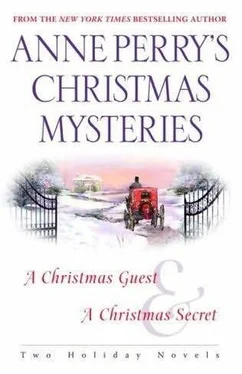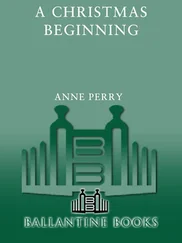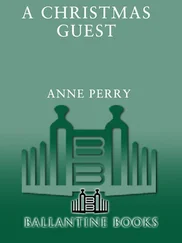Were they also protecting each other? Why did she ask herself that, when she was perfectly certain that they were?
If the Reverend Wynter had known some secret about them, what could it be?
She tested the irons on the hob. They were hot enough. She must pay attention to what she was doing. She could not afford to scorch Dominic’s shirts. Apart from the fact that she had too much pride in being a good wife, they were far too expensive to replace. They came from the days of his profession as a banker, long before he decided to be a minister.
She kept a piece of extra rag to test the temperature before touching the iron to a shirt. She tried it now, carefully; only when she was satisfied did she begin to iron.
If the vicar had known something about the Boscombes, it would have to be something they cared about passionately, and she did not believe that could ever be money. What was the most precious thing in the world to them? Not material goods of any sort. Not power or prestige. They had never had either, nor would they want them. They treasured warmth in their home, the laughter of children playing, the certainty of gentleness and companionship, and the good things that all people of true sanity want.
What could jeopardize those things?
The iron was getting hot in her hand. She snatched it off the collar and was flooded with relief that there was no brown mark on its white surface. The smell of warm, clean cotton filled the air.
Could there be something wrong with the Boscombes’ marriage, and somehow the vicar had discovered it? Had Genevieve been underage at the time? She looked several years younger than John. Perhaps her father had not given consent, and they had run away to be married, and lied to obtain permission. Did that make their union illegal? Had she been from a wealthy family and promised to someone else? But that would not invalidate their marriage.
Were any of their children conceived or born out of wedlock? That would be scandalous, but not irrevocable. Why would the Reverend Wynter concern himself with it? It might be a sin in the eyes of the church, but it was over and done with now. Surely a confession and absolution would deal with it.
She could find out. She had only to go to the church itself, which was next door across the strip of grass and up the path through the graveyard. The church records would be there in the vestry: marriages, christenings, and burials. Boscombe had said Genevieve grew up here. She would have been married here, too.
Very carefully she finished the final shirt. She put both irons to cool and carried the shirts upstairs. Clarice felt rather grubby, searching the parish records for someone else’s secrets, but sometimes one could feel grubby doing what was necessary to get to the truth. And if she found she was wrong, so much the better.
She put on her outdoor boots again and her heavy cape, then picked up the keys and went out. The snow was almost up to her knees in places where the land was low and it had drifted. The bare honeysuckle vine on the lych-gate was sparkling with icicles, and the path through the gravestones was slippery. The sky was ragged now, with patches of hard light making the expanse of the village green difficult to look at. The snow glared achingly white. She wondered if someone had fed the ducks. She should make sure, should take them something herself.
The church was bitterly cold inside. The stainedglass window with its pictures of Christ walking on the water cast patches of blue and green and gold light on the floor. The robe of St. Peter in the boat was the only warm color: a splash of wine. How many people down the centuries had brought their joys and their griefs here, made promises, prayed for forgiveness, or poured out their thanks?
She hurried to where the parish record books were kept. She unlocked the cupboard and found the one most likely to contain the baptism of the Boscombes’ oldest child. She skimmed through a couple of years’ worth of entries before finding it. It was a swift job, since the village was small: just four or five hundred people. Then she started to go backward, looking for John and Genevieve’s marriage. She went through ten years but didn’t find it. Twenty-three years before the birth of their first child, she came across Genevieve’s own baptism. Even more carefully she moved forward. There were baptisms of two sisters of Genevieve, then the burial of both her parents. The sisters’ marriages were recorded, but not baptisms of any children. Presumably they had moved to wherever their husbands lived.
Then Genevieve’s children were baptized, but Clarice could find no reference to her marriage.
Of course they could have been married somewhere else, but the ugly thought kept intruding into Clarice’s mind that perhaps they had not been married at all. Why would that be? The only reason she could think of was that something had prevented it. The obvious thing would be that one of them was already married. If it were Genevieve, the whole village would probably know; therefore, it must be John.
Had the Reverend Wynter somehow found that out?
She closed the book and replaced it, locking the cupboard door. She walked back through the icy vestry and outside into the freezing world again. It glittered sharp on daggers of water from the earlier thaw, now hanging from every black branch.
Her feet crunched on the surface. There were gray clouds looming in from the west, fat-bellied with more snow. Little shivers of wind stirred the topmost branches.
***
When Dominic returned at lunchtime, she told him what she had found.
“She could have been married somewhere else,” he said, taking a fresh piece of bread and another slice of cold mutton. “Perhaps in his village. He might have had elderly parents who couldn’t travel, for example.”
She passed him the rich, sharp pickle. “Possibly. But the Boscombes are in some kind of hardship. There are lots of small signs of it, if you look.”
He smiled with a touch of sadness, and she saw the mounting pain in his eyes. They were not in that situation themselves, but it was not too far ahead of them if he remained a curate much longer. She regretted having said it, yet she could not deny the evidence she had seen in the Boscombes’ house. Perhaps avoiding the subject of poverty was in a way making it worse, as if it were a secret too shameful to acknowledge.
“People do fall on harder times without there being a dark secret,” he pointed out ruefully.
“I know.” She poured him more tea although he had not asked for it. One of her pleasures was to notice his needs and meet them before he said anything. “It’s just a little piece of information. But I think it fits in with the missing pennies in the ledgers, the fact that John Boscombe suddenly resigned from his position in the church, and that they are both afraid of something. None of which would matter if the Reverend Wynter were not dead. But he is, and at least for now, this is your village.” Then she corrected herself. “Our village.”
He frowned. “Why would their not being married, and the vicar knowing that, have anything to do with financial hard times or the petty thefts from the collection? That doesn’t make any sense.”
She struggled through the confusion in her own mind. “I think he knew about the petty thefts before giving up his job keeping the books. He was close enough to the vicar that they trusted each other. Then something happened, and John Boscombe left. They still go to church, as everyone does, but that’s all. Could mean their sudden tightening of circumstances dates from that time, too. With children you can go through sheets quickly. You’ll wash them every other week, perhaps give them a little rubbing. Middles can wear thin. Best to trim them before they actually tear.”
Читать дальше










